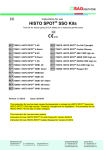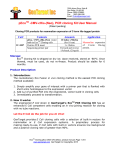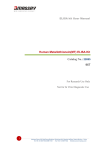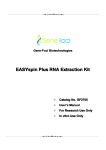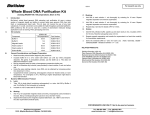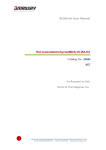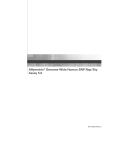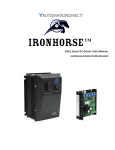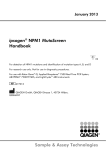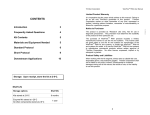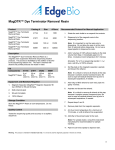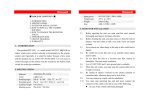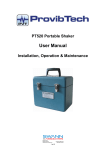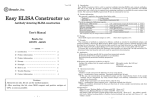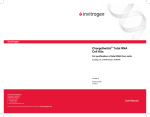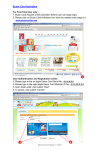Download Mag-Bind® mRNA Enrichment Kit
Transcript
Mag-Bind® mRNA Enrichment Kit R6520-00 R6520-01 2 preps 10 preps January 2014 Mag-Bind® mRNA Enrichment Kit Table of Contents Introduction................................................................................. 2 Kit Contents/Storage and Stability.......................................................3 Working with RNA.......................................................................................4 Mag-Bind® mRNA Enrichment - Standard Protocol....................5 Mag-Bind® mRNA Enrichment - Centrifugation Protocol...........7 Troubleshooting Guide.............................................................................9 Manual Revision: January 2014 Innovations in nucleic acid isolation 1 Introduction High purity mRNA is critical for downstream applications such as RT-PCR and QRT-PCR, The Mag-Bind mRNA Purification Kit provides a convenient and rapid method for the isolation of high purity of mRNA from total RNA samples. This kit is based on Mag-Bind magnetic particles which have a large surface compare to other standard magnetic beads and delivery high purity of mRNA. The magnetic bead format also can be easily scaled up and down according to the sample, offering scalability and flexibility for a variety of downstream applications. If using the Mag-Bind mRNA Kit for the first time, please read this booklet in its entirety to become familiar with the procedures. The oligo(dT) magnetic particles are mixed with total RNA solution. Poly(A)+ RNA hybridizes to the magnetic particles under optimized conditions. After applying the magnetic field, the magnetic particle/mRNA complexes is pulled out of the solution. Contaminants are removed by aspiration, and then the magnetic beads are thoroughly washed by two quick wash steps. Purified mRNA is eluted from the magnetic particles in an aqueous solution. New in this Edition: The latest manual has been redesigned to enhance readability and layout. Binding Capacity: 100ul of the Mag-Bind oligo(dT) magnetic beads solution can bind approximately 4 μg of mRNA. 2 Kit Contents and Storage Kit Contents Product No. R6520-00 R6520-01 2 10 Oligo(dT) Magnetic Beads 110 μl 550 μl 2X Mag-Bind® mRNA Binding Buffer 500 μl 5 ml Mag-Bind® mRNA Wash Buffer 500 μl 3 ml mRNA Elution Buffer 500 μl 1.5 ml 1 1 Purification User Manual Storage and Stability All components of the Mag-Bind® mRNA Enrichment Kit should be stored at 22-25°C. Under these conditions, RNA has successfully been purified and used for RT-PCR after 12 months of storage. Do not freeze the Mag-Bind oligo(dT) magnetic beads solution . 3 Working with RNA Please take a few minutes to read this booklet thoroughly to become familiar with the protocol. Prepare all materials required before starting to minimize RNA degradation. • Whenever working with RNA, always wear latex gloves to minimize RNase contamination. Change gloves frequently. Use only clean RNase-free disposable plastic pipette tips when using the supplied reagents. • During the procedure work carefully but quickly. • Under cool ambient conditions, crystals may form in the Mag-Bind mRNA Binding Buffer. This is normal and the bottle may be warmed to 50°C to redissolve the salt. 4 Mag-Bind mRNA Protocol - Standard Protocol Mag Bind mRNA Protocol - Standard Protocol Materials to be provided by user: • • • • Magnetic Stand for 1.5 ml tube (OBI # MSD-02) Nuclease-free 1.5ml centrifuge tubes Optional: Absolute Ethanol, chilled at -20°C Incubator capable of 70°C Before Starting: • Set an Incubator to 65°C, After Step 3 increase to 70°C 1. Prepare the total RNA (100µg) in 100µl of mRNA Elution Buffer or 100µl of NucleaseFree water. Note: if the concentration of total RNA is less than 1µg/µl. The 100µg of RNA will have a volume large than 100µl. In this case, increase the volume of the Mag-Bind mRNA Binding Buffer used in step 4 to equal the initial volume of the total RNA sample 2. Swirl or shake the vial of Mag-Bind®Oligo(dT) magnetic beads until the particles are in a homogeneous suspension. 3. Heat the Total RNA sample to 65°C for 4 minutes. 4. Transfer 50μl of Mag-Bind® oligo(dT) magnetic beads into the total RNA sample. 5. Add 150μl of 2 x Mag-Bind mRNA Binding Buffer, mix by pipetting. Incubate at 70°C for 3 minutes and then place at room temperature for 10 minutes. 6. Collect the magnetic beads by placing the tube on a magnetic separation device (MSD-02). The liquid should be cleared after the magnetic beads are completely pelleted. 7. Aspirate the supernatant by pipetting. Remove the tube from the magnetic stand. 8. Wash the magnetic beads again by adding 200µl of mRNA Wash Buffer. Resuspend the magnetic beads by vortexing for 20 seconds. 9. Collect the magnetic beads by placing the tube on a magnetic separation device (MSD-02). The liquid should be cleared after the magnetic beads are completely pelleted. 5 Mag-Bind mRNA Protocol - Standard Protocol 10. Aspirate the supernatant by pipetting. Dry the magnetic beads pellet by air for 5-10 minutes. Remove any liquid with a pipettor. 11. Remove the tube from the magnetic stand and then add 100μl of mRNA elution Buffer to the particles. Incubate the tube at room temperature with gentle agitation for 5 minutes to release mRNA from the magnetic particles. 12. Place the tube on a magnetic stand to collect the magnetic particles. 13. Transfer the supernatant containing eluted mRNA into a RNase-free tube. The RNA can be store at -20°C for short term storage and -80°C for long term storage. 14. Optional: Precipitate mRNA by ethanol precipitation: Add 10µl of 5 M NaCl and 2.5 volume of cold absolute ethanol. Incubate for 20 minutes at -20°C. Centrifuge at maximum speed for 10 minutes at room temperature. Wash once with 300µl of 70% ethanol and dissolve the purified mRNA with 10-20µl of nuclease-free water. 6 Mag-Bind mRNA Protocol - Centrifugation Protocol Mag-Bind mRNA Protocol - Centrifugation Protocol Materials to be provided by user: • • • • • Microcentrifuge with adaptor for 1.5 ml tube Nuclease-free 1.5ml centrifuge tubes Optional: Absolute Ethanol, chilled at -20°C Microcentrifuge Incubator capable of 70°C Before Starting: • Set an Incubator to 65°C, After Step 3 increase to 70°C 1. Prepare the total RNA (100:g) in 100µl of mRNA Elution Buffer or 100µl of NucleaseFree water. Note: if the concentration of total RNA is less than 1:g/:l. The 100:g RNA will have volume large than 100:l. In this case, increase the volume of the Mag-Bind mRNA Binding Buffer used in step 4 to equal the initial volume of the Total RNA sample 2. Swirl or shake the vial of Mag-Bind® oligo(dT) magnetic beads until the particles are in a homogeneous suspension. 3. Transfer 50μl of Mag-Bind® oligo(dT) magnetic beads into the Total RNA sample. 4. Add 150μl of 2 x Mag-Bind mRNA Binding Buffer, mix by pipetting. Incubate at 70°C for 3 minutes and then place at room temperature for 10 minutes. 5. Centrifuge at 8,000 x g for 1 minute to collect the magnetic particles. 6. Carefully remove the supernatant with a pipettor. Avoid disturbing the magnetic particles pellet. 7. Wash the magnetic beads by adding 200µl of mRNA Wash Buffer. 8. Centrifuge at 8,000 x g for 1 minute to collect the magnetic particles. 9. Carefully remove the supernatant with a pipettor. Avoid disturbing the magnetic particles pellet. 7 Mag-Bind mRNA Protocol - Centrifugation Protocol 10. Wash the magnetic beads again by adding another 200 µl mRNA Wash Buffer. 11. Centrifuge at 8,000 x g for 1 minute to collect the magnetic particles. 12. Carefully remove the supernatant with a pipettor. Avoid disturbing the magnetic particles pellet. 13. Centrifuge at 10,000 x g for 1 minute to collect the magnetic particles. 14. Carefully remove the supernatant with a pipettor. Avoid disturbing the magnetic particles pellet. 15. Dry the magnetic beads pellet by air for 5-10 minutes. Remove any liquid with a pipettor. 16. Add 100μl of mRNA elution Buffer to the particles. Incubate the tube at room temperature with gentle agitation for 5 minutes to release mRNA from the magnetic particles. 17. Centrifuge at 10,000 x g for 2 minutes to collect the magnetic beads. 18. Transfer the supernatant containing the eluted mRNA into a RNase-free tube. The RNA can be store at -20°C for short term storage and -80°C for long term storage. 19. Optional: Precipitate mRNA by ethanol precipitation by adding 10µl of 5 M NaCl and 2.5 volume of cold absolute ethanol. Incubate for 20 minutes at -20°C. Centrifuge at maximum speed for 10 minutes at room temperature. Wash once with 300µl of 70% ethanol and dissolve the purified mRNA with 10-20µl of nuclease-free water. 8 Troubleshooting Guide Please use this guide to troubleshoot any problems that may arise. For further assistance, please contact the technical support staff, toll free, at (800-832-8896). Possible Problems and Suggestions Problem Cause Solution Follow protocol closely, and work quickly. RNase contamination from handling Ensure not to introduce RNase during the procedure. Degraded RNA RNase contamination from total RNA sample Problem Wear gloves throughout the procedure and when handling the solution and equipment used for RNA isolation. Cause Check Total RNA sample for RNase contamination: incubate the total RNA sample at 65C for 5 minutes and then incubate at room temperature for 10 minutes. Analyze the sample by agarose gel electrophoresis. RNase contamination can be determined by loss or smear of 18S and 28S rRNA bands. Solution Ensure Total RNA sample is heated at 65°C prior to addition of magnetic particles. rRNA contamination rRNA co-purified with mRNA Problem Cause Solution OD260/OD280 ration is too low Magnetic beads interference Completely remove the magnetic particles by magnetic stand or centrifugation. If the rRNA level is too high for downstream application, purify the mRNA with second round purification with fresh magnetic particles. 9 Problem Cause Solution Optical densities do not agree with DNA yield on agarose gel. Trace contaminants eluted from column increase A260. Make sure to wash Mag-Bind pellet as instructed. Alternatively, rely on agarose gel/ethidium bromide electrophoresis for quantization. Cause Solution RNase A not added to Solution I. Add 1 vial of RNase to each bottle of Solution I. Cause Solution Ethanol not completely removed before elution. Increase air dry time before elution step Cause Solution RNA visible on agarose gel. Plasmid DNA floats out of well while loading agarose gel Plasmid DNA will not perform in downstream application 10 The DNA plate must be washed with Traces of ethanol remain absolute ethanol and dried before on column prior to eluelution. Ethanol precipitation may be tion. required following elution.











